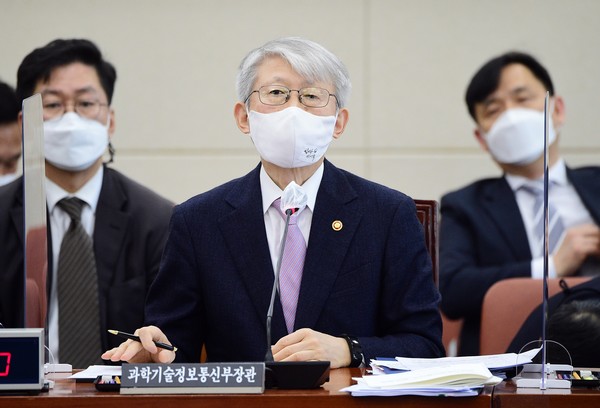Only foreign market share could increase due to poor regulation
Mid-to-low-priced phone quota system, concerns about deteriorating profitability of domestic manufacturers

▲ Minister of Science and Technology Information and Communication Choi Ki-young answers inquiries at the general meeting of the Science and Technology Information Broadcasting and Communication Committee held at the National Assembly on the 17th. yunhap news
With LG Electronics’ withdrawal of the smartphone business, the monopoly issue has emerged as an issue. Amid various stories about the smartphone market in politics, concerns about reverse discrimination against domestic companies are also growing.
According to the industry on the 25th, the government is constantly struggling over the issue of smartphone monopoly. Minister of Science and Technology Information and Communication Choi Ki-young said at a general meeting of the National Assembly’s Science and Technology Information Broadcasting and Communication Committee on the 17th that “I will look at the market trends and take measures” related to LG Electronics’ withdrawal of smartphone business.
At the New Year’s conference held online on the 22nd, Minister Choi said, “I know there are difficulties in the mobile phone business, and we are discussing it internally.” I will do it.”
Minister Choi’s remarks on pointing out that if LG Electronics withdraws from the smartphone business, Samsung Electronics’ domestic market share will rise to more than 70% and the consumer burden will increase.
The industry is concerned that the movement of politicians’ monopoly sanctions is contrary to market logic and could lead to reverse discrimination against domestic companies. It is pointed out that it is questionable whether the share of other companies will increase by limiting the share of certain companies.
In particular, with only Samsung Electronics remaining in the domestic smartphone companies, weak regulations can only increase Apple’s share. China and Japan Sony, such as Xiaomi and Huawei, challenged the domestic market, but they did not receive the consumer’s choice. It is in a situation that it cannot push foreign products to avoid the monopoly issue.
The domestic smartphone market share in the third quarter of last year was Samsung (72.3%), Apple (13%), and LG (14%). In the fourth quarter, Samsung Electronics (58%) and Apple (31%) also surpassed Apple in market share, but Apple increased its market share in the fourth quarter due to the effect of new products. Samsung Electronics’ quarterly market share has stagnated, with an increase and decrease of 1 percentage point compared to the previous year, but Apple increased by up to 5 percentage points and surpassed the domestic market share of 30% in the fourth quarter of last year.

▲ Domestic smartphone market share (Source = Counterpoint Research)
Some people are discussing the introduction of a mid-to-low priced phone quota system to solve the problem of smartphone monopoly. It is said that smartphone makers must produce at least a certain percentage of low- and mid-priced terminals. However, it is unclear whether demand will diverge to mid- to low-end phones by implementing a quota system in a situation where domestic premium smartphone demand is high.
An official in the manufacturing industry said, “It is not possible to limit consumers who want to buy premium phones to increase mid- to low-priced phones.” “Apple, which only offers expensive models, is a foreign company and has limitations in applying the quota system. “I pointed out.
The telecommunications industry is not in an atmosphere of welcoming the quota system for mid- to low-priced phones. An official in the telecom industry said, “There will be no telecom companies that want to increase the number of subscribers with a well-selling phone, but want to be affected by the sales of mid- to low-end phones.” “Premium phones have a lot of support, so they can be marketed at a reasonable price.”
There is also concern about deteriorating profitability of domestic manufacturers due to the mid-to-low priced phone quota system. LG Electronics’ smartphone sales of models under $150 (about 170,000 won) as of the third quarter of last year were 64%, up 5 percentage points (p) from two years ago.
Counterpoint Research, a market research firm, said, “The reduction in the proportion of high-priced products of LG smartphones led to a decline in profitability, and as LG increased the proportion of ODM (manufacturer development and production) to improve profitability, it eventually led to a structure in which the proportion of mid-to-low prices would inevitably increase. It’s done.”
The issue of smartphone monopoly is a hot topic in the US as well as in Korea. At a US Congress hearing in July last year, lawmakers raised a’market monopoly suspicion’ targeting the chief executives (CEOs) of’Big 4′, an information technology (IT) dinosaur in the United States such as Amazon, Apple, Google, and Facebook. It was the first time that CEOs of these four companies had attended a congressional hearing at the same time, and Apple CEO Tim Cook’s response drew attention.
“Apple doesn’t have a monopoly share in any market we do business,” said Tim Cook. In particular, the smartphone market is competing fiercely with companies such as Samsung, LG, and Huawei,” he said. “Our goal is the best, not the greatest.”
